When it comes to preparing baby formula, every parent wants to ensure the utmost safety and health for their little one. One key component of baby formula preparation is the water used to mix the powder or concentrate. But can any water source be used, or are there specific types that are safer and healthier for your baby? More specifically, can you mix baby formula with purified bottled water?
This article will delve into the topic, discussing the role of water in baby formula preparation, what purified water is, and whether or not it’s safe to use in baby formula. Our primary goal is to provide clear, research-backed information to help you make informed decisions about your baby’s nutrition. We strongly recommend always consulting with a healthcare provider for personalized advice tailored to your baby’s specific needs. Now, let’s dive into the details to understand better the suitability of purified water for your baby’s formula.
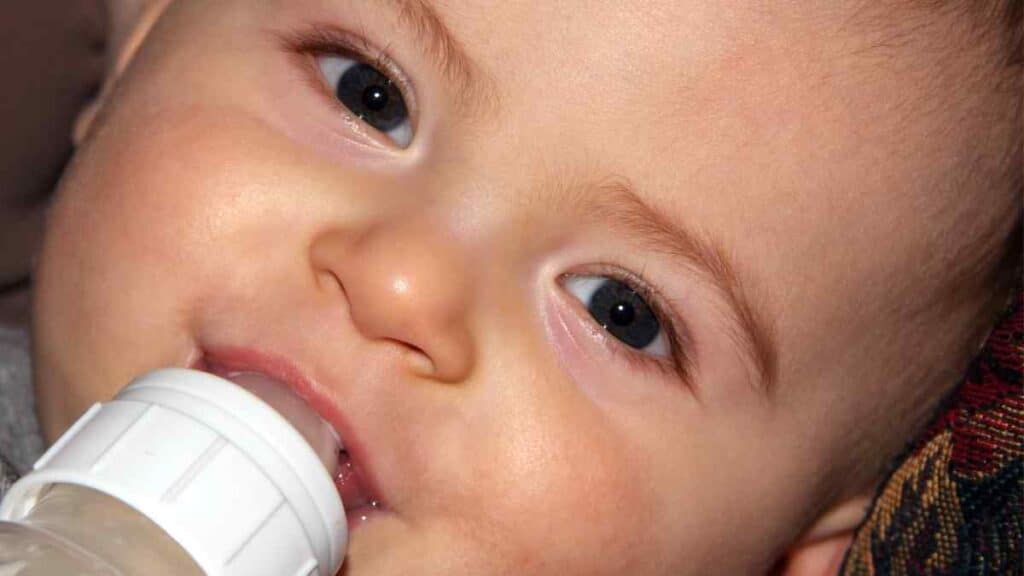
A Brief Introduction to Baby Formula
Baby formula serves as a crucial nutritional source for babies who cannot be breastfed or are weaned off breast milk. It comes in three forms: powdered formula, liquid concentrate formula, and ready-to-feed formula. Each type requires different preparation steps. The safety of the water used for mixing or diluting the formula is paramount and depends on several factors.
Powdered formula is the most common form and needs to be mixed with water. When preparing formula from a powder or liquid concentrate concentrated liquid, the water’s quality matters significantly. The three types of water you can use include tap water, bottled water, and purified or distilled water.
Using Tap Water for Your Baby’s Formula
Tap water comes directly from your local water supply. If you are using tap water to mix formula, you should have your water tested, especially if it is well water [1]. The Environmental Protection Agency can provide resources for having your water tested. Tap water is often fluoridated to help prevent tooth decay, but too much fluoride can cause faint white lines or streaks on your baby’s teeth.
Bottled water, often labelled as ‘nursery water,’ can be an alternative to tap water. However, some brands may contain high levels of fluoride, similar to fluoridated tap water. Therefore, parents should opt for low-fluoride bottled water or fluoride-free water whenever possible.
The other option, purified or distilled water, undergoes a process that removes impurities and minerals, including fluoride. The purification process might make you wonder: is purified water the same as distilled water? Not exactly. While both are processed to remove impurities, distilled water is boiled into vapor and then cooled to return it to a liquid form, leaving behind most of the minerals and contaminants. On the other hand, purified water can be produced using various techniques like filtration, reverse osmosis, or ultraviolet disinfection.
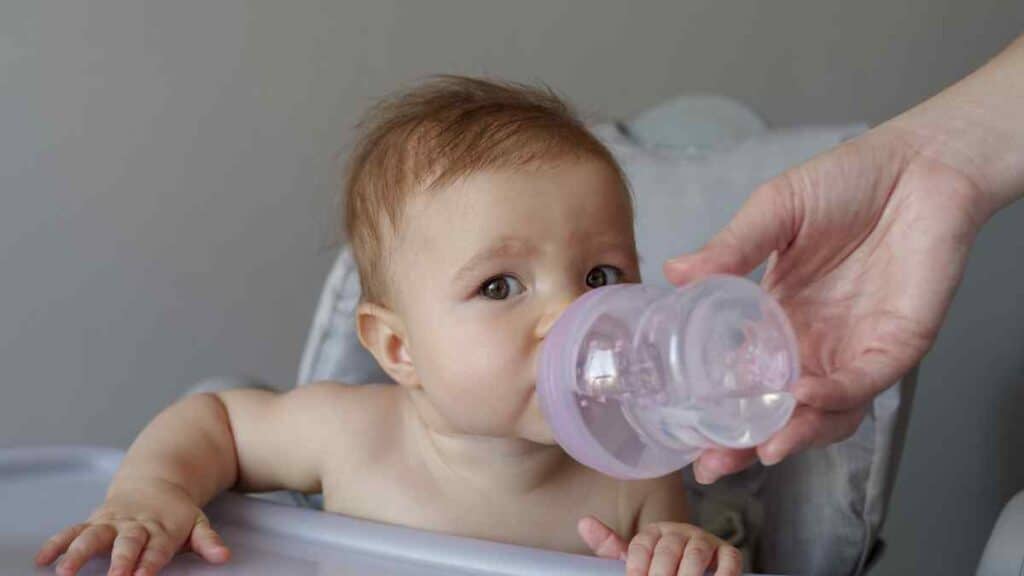
Purified vs. Distilled Water: Which is Better?
The choice between purified vs distilled water for baby formula preparation depends largely on your preference and your baby’s needs. Neither distilled nor purified water should pose a risk to healthy infants, though distilled water might lack beneficial minerals found in other types of water.
Some may argue that the best water for baby formula is a ‘ready-to-feed’ formulas. These do not need any water added to them and reduce any potential water safety concerns.
However, in all cases, it is essential to follow the instructions on the formula container and be sure to serve formula at a safe temperature, ideally body temperature. Formula feeding involves more than just selecting a type of formula. Understanding how to mix formula properly and safely is crucial for your baby’s health.
As always, consult your pediatrician for advice based on your baby’s specific needs. They can provide guidance on whether your baby can drink distilled water by itself, or if they would recommend nursery water vs distilled or tap vs bottled. Their advice will also account for potential risks, such as disease control and tooth decay.
While this introduction provides a general overview, it’s important to remember that each baby’s needs are unique, and what works best for one might not work for another. Always consult with a healthcare provider for personalized advice.
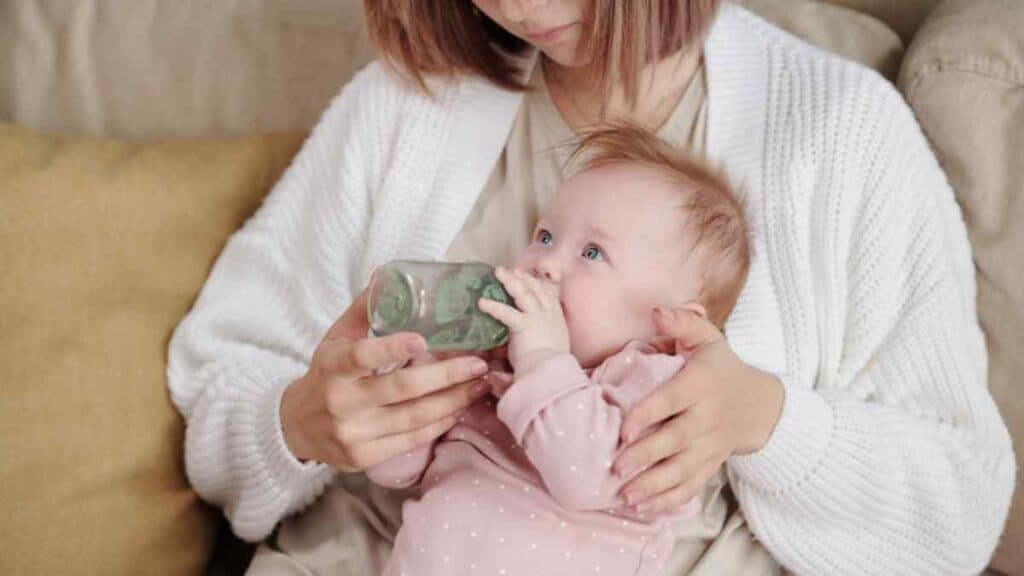
Role of Water in Baby Formula Preparation
Water acts as the primary diluent for two types of infant formula: powder formula and liquid concentrate. In powdered formula, the formula powder is mixed with water to provide the necessary hydration and nutrients for the baby. With liquid concentrate, water is added to thin the formula to an appropriate consistency for the baby’s consumption. Even ready-to-feed formulas, which do not require the addition of water, are mostly water themselves.
The temperature of the water used for making formula is also crucial. Most caregivers prefer to use warm formula, as it’s more appealing to babies and more closely mimics the temperature of breast milk. However, too hot water can damage the nutrients in the formula and can also pose a risk of burns. Therefore, it’s important to test the temperature of the formula by sprinkling a few drops on the inside of your wrist before feeding.
Importance of Water Quality for Infant Health
The quality of water used in infant formula preparation directly impacts a baby’s health. Bottled water, distilled water, and tap water (purified or fluoridated) are common options, but their quality can vary. Babies, particularly newborns and those born prematurely, have a weakened immune system, making them vulnerable to bacteria and other contaminants found in poor-quality water.
Regular bottled drinking water can be used, but it’s important to check that it’s free of harmful contaminants. The same applies to tap water. If using tap water, consider contacting your local water company or local health department to learn more about the water’s quality and whether it’s safe for your baby.
In the debate of purified vs distilled water for baby formula, both have been processed to remove contaminants, but they differ in the remaining mineral content. Distilled water has most of its minerals removed along with the contaminants, while purified water might still retain some minerals, which could be beneficial for your baby’s health.
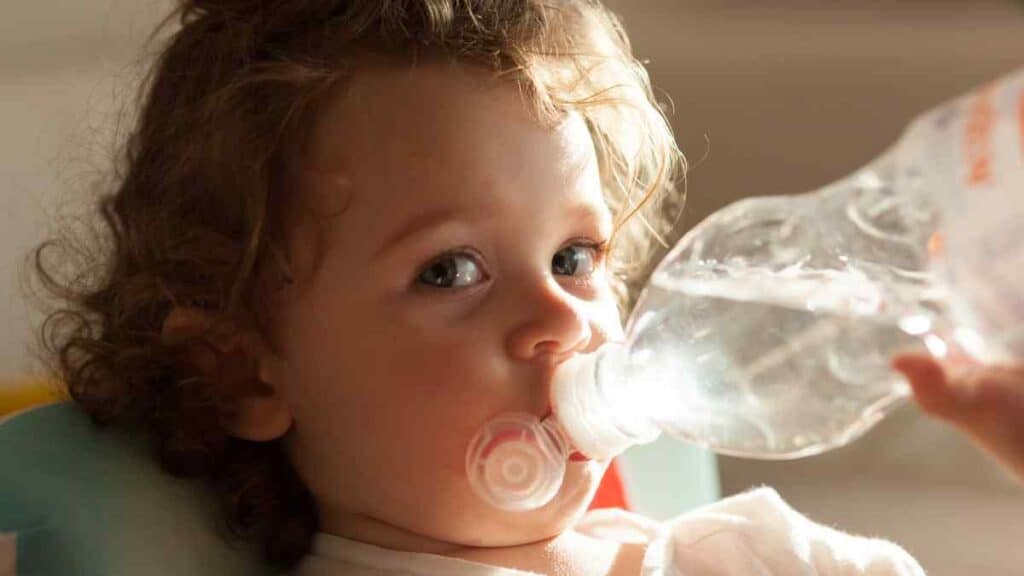
Potential Risks Associated with Poor Quality or Contaminated Water
The use of poor-quality or contaminated water in baby formula can lead to several health issues. These can range from mild conditions such as mild dental fluorosis (caused by too much fluoride) to severe ones like bacterial infections. Using hot water directly from the tap to make formula can increase the risk of lead exposure if your home has lead pipes. Always use cold tap water and heat it separately to avoid this risk.
Formula prepared with contaminated water can pose a risk of diseases. In some rare cases, the formula itself may contain bacteria, which is why it’s recommended to prepare each feeding’s formula fresh and not store it for extended periods.
A baby’s doctor can provide fluoride supplements if your water supply is fluoride-free and the baby needs them. On the other hand, if the water contains high fluoride levels, using it consistently can lead to mild dental fluorosis, a condition that can cause faint white lines or streaks on the teeth.
Can You Mix Infant Formula with Purified Water?
The role of water in infant formula is critical, and the quality of water used in formula preparation can significantly impact the baby’s health. The question often arises: can you mix infant formula with purified water? Let’s explore the suitability of purified water for baby formula.
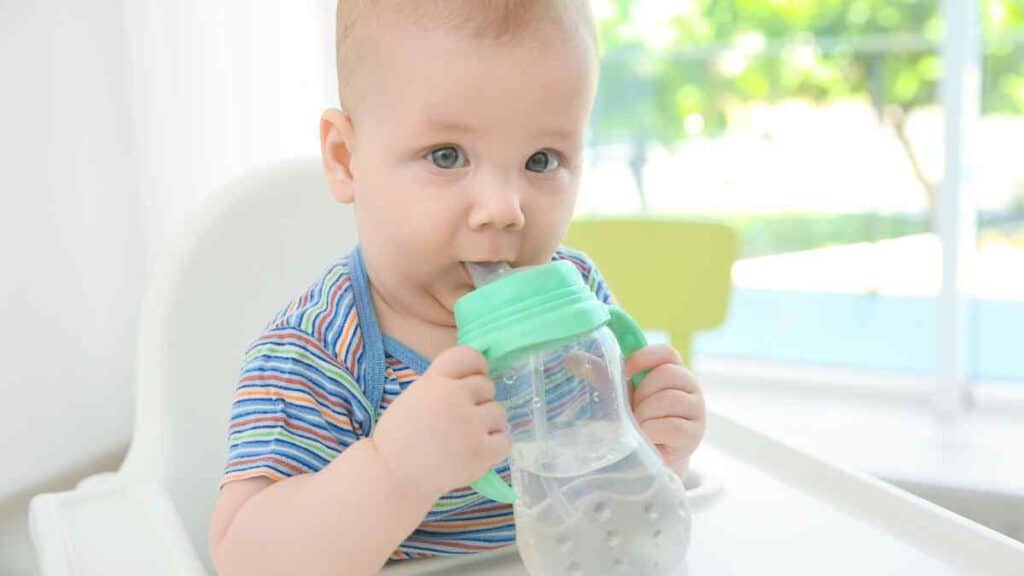
Purified water undergoes a filtration process that removes most of the impurities, including bacteria, viruses, and chemicals, thereby providing a safer option for mixing formula. But, is purified water the same as distilled water? While both are processed to remove impurities, they differ in terms of mineral content. Distilled water leaves behind almost all minerals during the boiling process, while purified water may still retain some minerals, which can be beneficial for your baby’s health.
Given the potential health risks associated with contaminated water, such as bacterial infections, purified water can be a safer choice for making formula. However, some considerations should be noted.
Purified water is not the same as fluoridated water. While fluoride is beneficial in preventing tooth decay, too much of it can cause mild dental fluorosis characterized by faint white lines or streaks on the teeth. If you use purified or distilled water (which are typically fluoride-free), your baby’s doctor might recommend fluoride supplements if needed.
Another important aspect is the preparation of the formula. After making formula, you should serve it immediately or store it in the refrigerator and use it within 24 hours. It’s recommended to cool the prepared formula quickly, which can be done in an ice bath, and then store it in the fridge to help with disease control and prevent bacterial growth.
When serving the formula, ensure it’s not too hot to avoid burns in the baby’s mouth. If the formula is prepared in advance and stored in the refrigerator, it should be used within 24 hours, and any unused formula that has been warmed or left out of the fridge for more than two hours should be discarded.
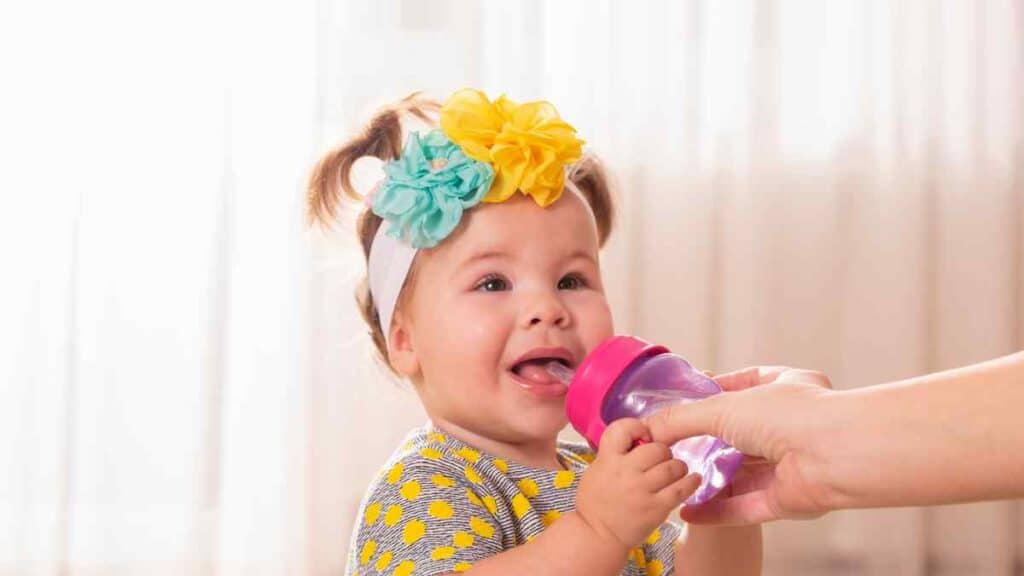
Conclusion
In conclusion, the type of water used to prepare baby formula is crucial for your baby’s health. While various options are available, including tap water, bottled water, distilled water, and purified water, each comes with its considerations. Purified water, free from most contaminants and potential bacteria, is a generally safe choice for mixing baby formula.
However, it is essential to remember that while purified water is usually fluoride-free, a certain amount of fluoride is beneficial for your baby’s dental health. If you consistently use purified or distilled water for formula preparation, your baby’s doctor might recommend fluoride supplements.
Ultimately, whether you choose to use purified water or another type, ensuring that the water is clean and safe and that the formula is prepared correctly will go a long way in maintaining your baby’s health. Remember, the well-being of your little one is the top priority, and every decision you make contributes to their growth and development.
Did this article help you? Let us know in the comments below.



